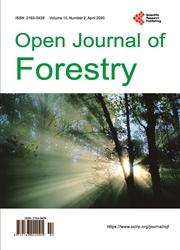Fine Roots Dynamics in Two Forest Strata of a Semi-Deciduous Forest in Northern Republic of Congo
引用次数: 1
Abstract
The belowground biomass is represented by coarse and fine roots. Concentrated in the superficial horizons of the soil, the fine roots play a crucial role in the functioning of a forest ecosystem. However, studies on their dynamics in natural forests are almost non-existent in the Republic of Congo. Here, we estimated the biomass, production, turnover and fine root lifespan of two forest strata of a semi-deciduous forest: the Gilbertiodendron dewevrei (De Wild.) J. Leonard forest (GF) and the mixed forest (MF) of land. The ingrowth cores method was used to estimate the biomass, production, turnover and lifespan of fine roots. The results of this study revealed that the biomass, production and fine root turnover of the two forest strata studied significantly decreased with increasing soil depth, with an increase in lifespan. The annual fine root biomass of GF (2284.50 ± 37.62 and 1034.61 ± 14.52 ) was slightly lower than that of MF (2430.07 ± 40.68 and 1043.10 ± 11.75 ) in the 0-15 cm and 15-30 cm horizons, respectively. The annual production of fine roots from these latter horizons was respectively 1300.19 ± 32.17 and 539.18 ± 11.55 in GF and 1362.24 ± 39.59 and 492.95 ± 14.38 in the MF. Root turnover was higher in the GF (1.68 ± 0.05 and 1.35 ± 0.03 ) than in the MF (1.57 ± 0.05 and 1.13 ± 0.02 ). The lifespan of fine roots increased with the depth of the soil. The difference in fine root dynamics observed between the forest strata studied was influenced by the Evenness index and the above-ground biomass.刚果共和国北部半落叶森林两层细根动态研究
地下生物量以粗根和细根表示。细根集中在土壤的表层,在森林生态系统的运作中发挥着至关重要的作用。然而,在刚果共和国,几乎没有对其在天然林中的动态进行研究。在这里,我们估计了半落叶林的两个森林层的生物量、产量、周转率和细根寿命:Gilbertiodendron dewevrei(De Wild.)J.Leonard森林(GF)和混合森林(MF)。采用内生芯法对细根的生物量、产量、周转率和寿命进行了估算。研究结果表明,随着土壤深度的增加,所研究的两个森林层的生物量、产量和细根周转率显著降低,寿命延长。在0-15cm和15-30cm土层中,GF的年细根生物量(2284.50±37.62和1034.61±14.52)略低于MF的年细根生物量(2430.07±40.68和1043.10±11.75)。后一层的细根年产量在GF中分别为1300.19±32.17和539.18±11.55,在MF中分别为1362.24±39.59和492.95±14.38。根周转率在GF中(1.68±0.05和1.35±0.03)高于MF(1.57±0.05和1.13±0.02)。细根的寿命随着土壤深度的增加而增加。在所研究的森林地层之间观察到的细根动力学差异受到均匀度指数和地上生物量的影响。
本文章由计算机程序翻译,如有差异,请以英文原文为准。
求助全文
约1分钟内获得全文
求助全文

 求助内容:
求助内容: 应助结果提醒方式:
应助结果提醒方式:


